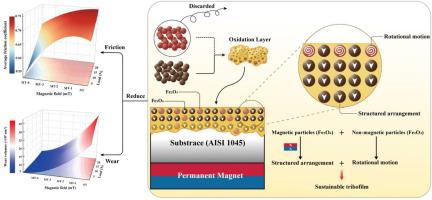Magnetic-Manipulation of tribofilm for Si3N4/1045 steel contact toward sustainable reduction in friction and wear
IF 10
1区 环境科学与生态学
Q1 ENGINEERING, ENVIRONMENTAL
引用次数: 0
Abstract
Conventional anti-wear approaches lead to energy inefficiency and excessive waste, posing significant challenges to sustainability and cleaner production. Herein, we investigate the influence of eco-friendly magnetic fields on the tribological behavior of interfaces, with an emphasis on the formation and characteristics of the protective tribofilm. The experimental design combined finite element analysis and friction tests to systematically reveal the relationship between magnetic field strength, oxidation of wear debris, and tribological properties. The results demonstrated that the introduction of a magnetic field led to a 22% reduction in the friction coefficient and a 28% decrease in wear volume. High-intensity magnetic fields refined the wear debris by up to 42.6% and also promoted the oxidation of wear debris, leading to a predominance of Fe3O4 in the tribofilm. The structured arrangement and reorganization of Fe3O4 particles within the tribofilm enhance its density and thickness (from 2 μm to 3 μm). Simultaneously, the rotational motion of Fe2O3 particles at the interface modifies the friction contact state, thereby refining friction performance. The findings underscore the significance of considering magnetic fields in the design of tribological systems for enhanced performance and sustainability.

用于 Si3N4/1045 钢接触的三层薄膜的磁性处理,可持续减少摩擦和磨损
传统的抗磨损方法导致能源效率低下和过度浪费,给可持续发展和清洁生产带来了巨大挑战。在这里,我们研究了环保磁场对界面摩擦学行为的影响,重点是保护性三膜的形成和特征。实验设计结合了有限元分析和摩擦测试,系统地揭示了磁场强度、磨损碎片氧化和摩擦学特性之间的关系。结果表明,引入磁场后,摩擦系数降低了 22%,磨损体积减少了 28%。高强度磁场将磨损碎片细化了 42.6%,还促进了磨损碎片的氧化,导致三膜中的 Fe3O4 占主导地位。三膜中 Fe3O4 颗粒的结构化排列和重组提高了其密度和厚度(从 2 μm 增加到 3 μm)。同时,Fe2O3 颗粒在界面上的旋转运动改变了摩擦接触状态,从而改善了摩擦性能。这些发现强调了在设计摩擦学系统时考虑磁场以提高性能和可持续性的重要性。
本文章由计算机程序翻译,如有差异,请以英文原文为准。
求助全文
约1分钟内获得全文
求助全文
来源期刊

Journal of Cleaner Production
环境科学-工程:环境
CiteScore
20.40
自引率
9.00%
发文量
4720
审稿时长
111 days
期刊介绍:
The Journal of Cleaner Production is an international, transdisciplinary journal that addresses and discusses theoretical and practical Cleaner Production, Environmental, and Sustainability issues. It aims to help societies become more sustainable by focusing on the concept of 'Cleaner Production', which aims at preventing waste production and increasing efficiencies in energy, water, resources, and human capital use. The journal serves as a platform for corporations, governments, education institutions, regions, and societies to engage in discussions and research related to Cleaner Production, environmental, and sustainability practices.
 求助内容:
求助内容: 应助结果提醒方式:
应助结果提醒方式:


